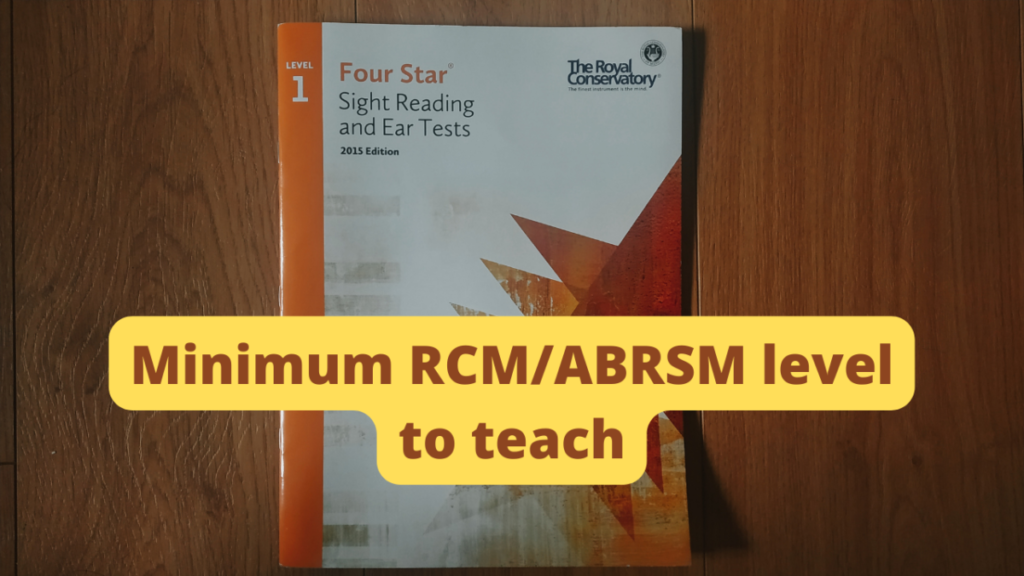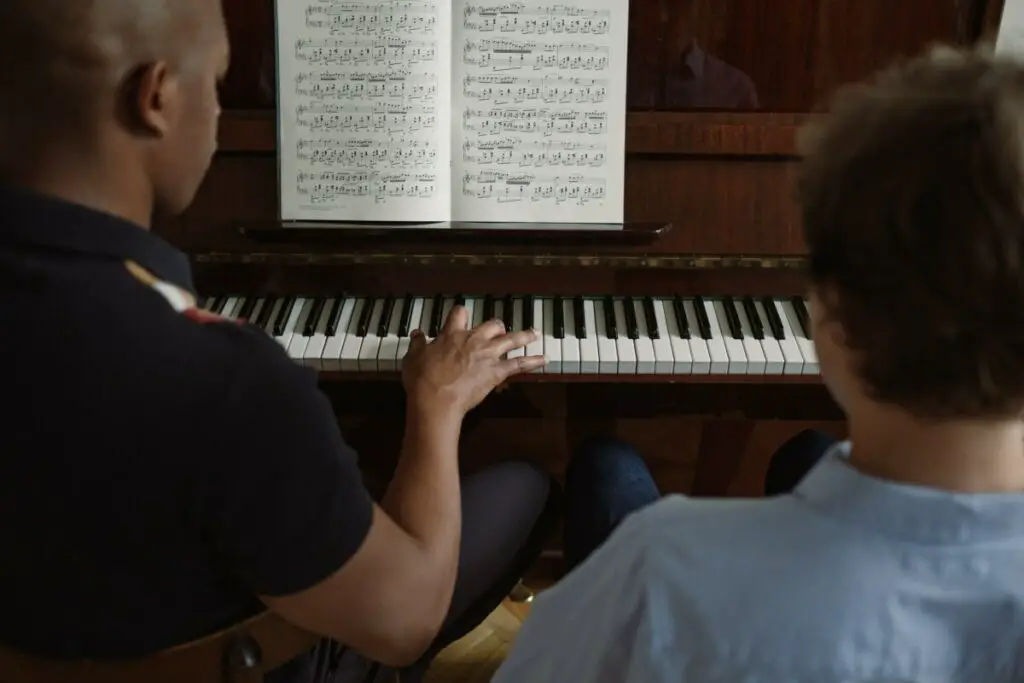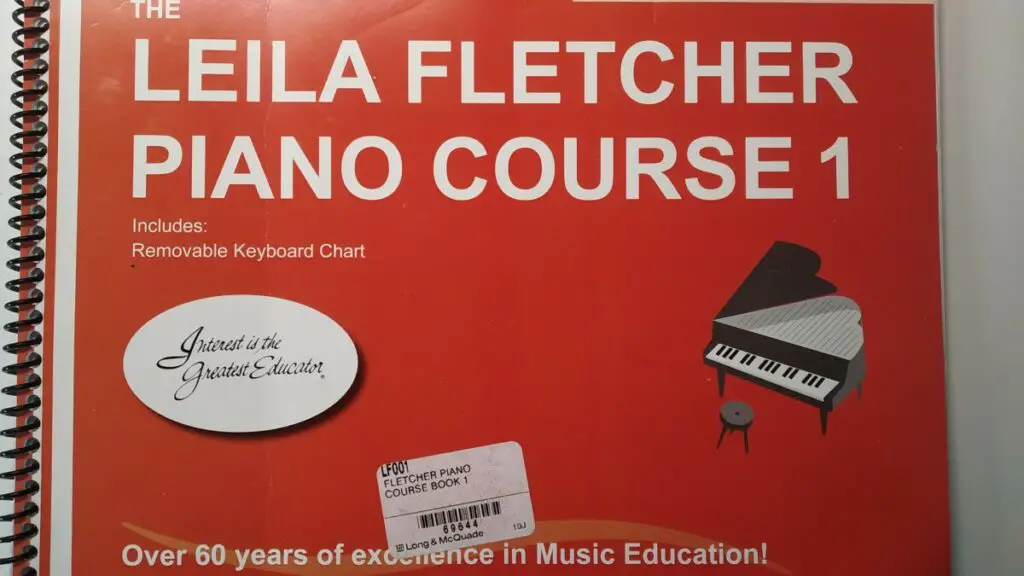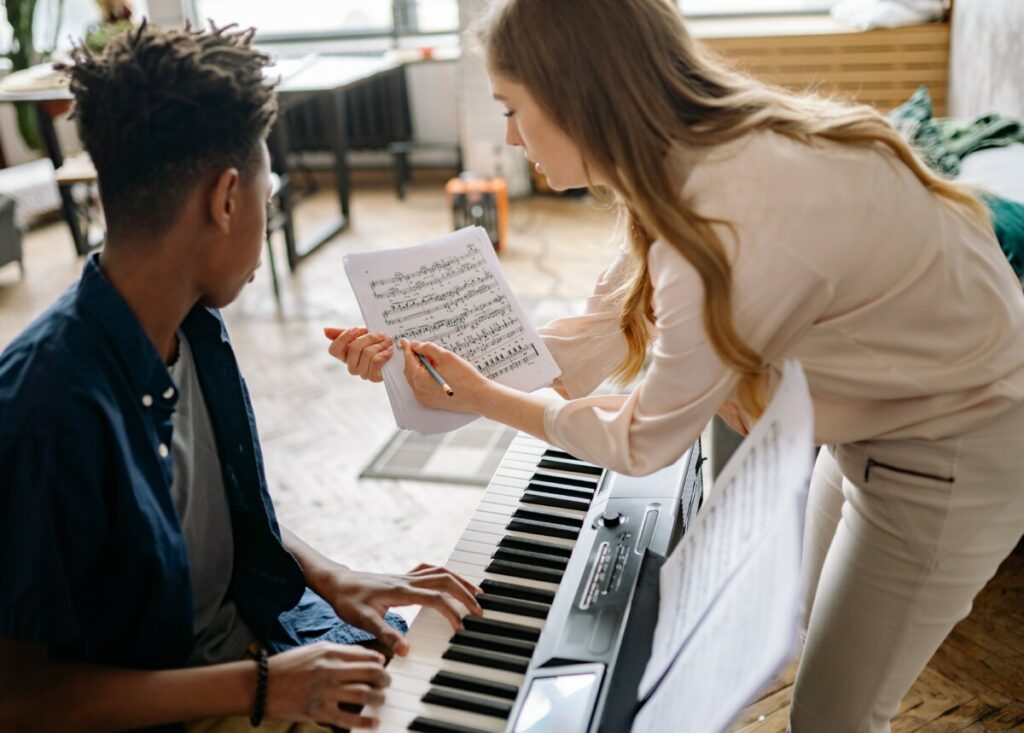This post contains affiliate links.

So you’ve been playing the piano for a long time and want to teach the knowledge you have to new aspiring piano students. However, you’re not sure what qualifications or skill level you need to be at before you can teach piano.
As a general rule, you need to achieve RCM level 10 or ABRSM grade 8 before you can teach piano. At this level, you are a well-rounded player and have a complete understanding of piano techniques and theories to teach someone else. It’ll take at least 10 years to reach this level.
Fun fact, being a piano teacher isn’t a regulated profession, meaning you don’t need any credentials or qualifications to teach piano.
That means in theory, anyone can set up shop and start offering lessons. However, no one wants to learn piano from a beginner piano player. Also, it’s unethical to teach something you don’t understand or have enough experience with since you’re ripping off your students.
Although you don’t need any credentials to teach piano, having one does help make you stand out against other piano teachers, increasing your chance of being employed.
The RCM and ABRSM programs are famous worldwide for moulding students into well-rounded pianists and are good benchmarks to use to see when a pianist is ready to teach piano with their levels/grades systems, rather than a vague “you need to be playing piano for X years before you can teach piano”.
This is because RCM/ABRSM exams are well-structured, if you pass a level, you’ll be able to play with musicality all the piano pieces of that level. Otherwise, it’s hard to measure your playing ability, even if you say you’ve been playing for 8 years.
In this article, I’ll go more in-depth about why you should complete the highest level of RCM/ABRSM before you can teach piano, and who you can teach with at this level.
I’ll also explain why getting a higher separate education degree is worth your time and money in regards to teaching piano, as well as give some tips on where to apply for piano teaching jobs and how to increase of chance of getting employed as a piano teacher.
Why do you need the highest level before you can teach piano?
So how come you need the maximum level of RCM/ABRSM to teach? Wouldn’t a sufficiently high level like RCM level 8 or ABRSM grade 6 be good enough to teach, especially if you want to teach complete beginners? Here are the reasons why:
High competition between piano teachers
With the piano being such a popular instrument, it makes sense that there will be a lot of piano teachers to fulfill the demand for learning the piano.
And with so many piano students achieving RCM level 10 or ABRSM grade 8 in their teens, due to them learning piano as a child, it’s a no-brainer for them to put that in their resume if they decide they want to one day start teaching piano.
As a result, it’s not uncommon to see most of the listings of piano teachers having the highest level of RCM/ABRSM in the description, raising the minimum bar of entry to that level if you want to compete to have students.
For example, one quick search on Superprof – a popular tutor listing site for piano teachers, shows that even in the least expensive options, most of the listings list the highest RCM/ABRSM level achieved.
With that said, if you live in a small city or town, then you can probably get students, even if you haven’t achieved the highest level/grade. However, you should consider postponing teaching until you reach the highest level of RCM/ABRSM because of the next reason:

You need to master the piano before teaching
Although completing the RCM/ABRSM programs doesn’t mean you’re a master of the piano since music is a lifelong journey, and you can learn so much more to improve your own playing, it does make you a well-rounded pianist at the end of it.
You’ll have a correct and complete understanding of music theory and proper techniques when playing the piano to teach other students.
Furthermore, you don’t see what technical errors you’re making until you’re playing harder and more advanced repertoires from the higher levels of RCM/ABRSM, and passing those errors on to your future students is the last thing you want to do.
With that said, it’s important to keep in mind being able to play the piano well doesn’t translate to being able to teach the piano well. Your communication and organization skills are more important than your playing skills as a piano teacher.
- Can you break down a hard concept into smaller easier-to-understand chunks?
- Do you have 5 other ways of explaining the concept if your student doesn’t understand the first one?
- How will you structure your lesson for a complete beginner, someone who has experience with the piano, 12 years old vs a 50 years old student?
- How will you help someone who can’t play both clefs at the same time?
- Etc…
As you can see, while being able to perform well does help with teaching, there are many more separate skills you need to learn to become a better piano teacher.
Who can you teach with this RCM/ABRSM level?
Assuming you don’t have any music or education degrees other than the highest RCM/ABRSM level achieved, you should start out by offering lessons to beginners players.
This is because there isn’t much focus on techniques at first when teaching beginners. It’s more important to teach the basics like reading music sheets, understanding what all the notes and symbols mean, and playing both hands at the same time with tunes in simple time.
By the way, this is also why a lot of teachers choose to have their beginner students do children’s piano workbook since it’s well structured and lays out all the basics in a logical way and makes it easy for the teacher to teach the materials.

You’ll gain valuable experience in teaching, find out which aspect of your teaching is working well for students and which one isn’t, as well as notice what students usually struggle with so that you can help them based on your own experience playing the piano.
Many teachers with no formal degrees choose to stop teaching their students that pass grade 5 ABRSM (RCM level 4 roughly) and pass them on to another more qualified teacher if they don’t feel confident they can continue teaching the students.
Get a degree to teach higher-level students
As mentioned above, with the piano being so popular, you probably need a dedicated degree to stand out amongst the competition between piano teachers, especially in big cities.
Not to mention that parents and adult students prefer to learn from a teacher with credentials compared to one without since it gives them a sense of security and trust.
You’ll also learn valuable skills and knowledge to enhance your own playing and teaching by going through a music degree or certificate program, ultimately benefiting the students by giving them the best learning experience they can get.
This makes a worthwhile option to consider since you will be able to charge more for your lessons while providing higher-quality teaching.
So what options do you have for a music degree? Here are a few:
Music diploma (2 years)
After finishing the diploma, you’ll have a comprehensive knowledge of music theory, history, and composition and improve your piano performance skills with one on one lessons with a faculty member. There will also be opportunities for you to play the piano at concerts or festivals.
Once finished, you can use this diploma to apply for higher education at a university to get an additional degree in music education.
Bachelor of music with major in education (4-5 years)
This degree allows you to finish both a music degree and an education degree at the same time.
You’ll learn the same things in a music diploma, plus education classes, and learn all about teaching and what it means to be a responsible and effective music educator. You’ll also get hands-on experience teaching.
Once you complete the degree, you’ll be ready to teach at all levels, either in public schools (primary or secondary) or private teaching.
RCM teaching certificate
This option is suitable for you if you follow the RCM program. This option is advantageous since RCM is widely recognized in North America and internationally.
Once you get your certificate, you’ll have access to:
- Online teaching resources from top teachers 24/7
- Exclusive online groups where you can ask questions and have them answered by fellow piano teachers
- List yourself in the National Music Teacher Directory which increases referrals, giving you a better chance of getting a student
To qualify, you need to:
- Meet their prerequisites
- Complete the RCM piano teacher course
- Submit 2 successful piano exam students at the required levels within two years of getting the certificate.
Here’s the link to the RCM Teaching Certificate.

ABRSM Certificate for Music Educators (CME)
This is suitable for people already following the ABRSM curriculum. This education program is developed by ABRSM to improve the skills and knowledge of music educators. You’ll learn how to effectively teach music to children and young people.
The program will be provided by organizations, music services, and colleges approved by ABRSM. Anyone can take this course, from a brand new teacher to a teacher with a couple of years of experience under their belt.
This program is flexible and accessible, a great choice for someone with a busy life that can’t fully commit 2-4 years to a music diploma or bachelor’s degree.
While you don’t need any formal credentials or degrees to apply for the program, the course provider will instead do an initial assessment to see if you have sufficient playing and music knowledge needed to be able to teach.
Here’s the link to the ABRSM CME
Some places to apply for piano teaching jobs
Music shops
You may find that some music stores that sell instruments also offer lessons. So you can try walking in and ask the manager if there’s a piano teacher position open.
If you’re currently taking piano lessons from a music shop or a music academy, you can ask your teacher if they know the shop is looking to hire another teacher and if you can qualify for it.
You may have a higher chance of getting the job since you’ve been a long-time patron of the shop and they know of your playing ability and determine if you are capable of teaching.
Online listings
You can try to make a piano lesson listing and post them on Facebook Marketplace to attract local students or list them on a tutor job posting website like Superprof.
One benefit of this route is that you’ll have complete control of who you choose to teach(beginner, experienced students, old, young) and what your teaching schedule looks like, instead of leaving them up to your employer’s hands.
Word of mouth
You can also try asking friends and families if they know of anyone that is looking for piano lessons for themselves or for their kids. Since there’s some kind of connection between you and your potential customer, they may overlook it even if you don’t have much experience teaching piano yet.

Put piano experience on your resume
To give yourself the best chance of getting employed, you need to put any significant piano-playing experience you have on your resume. It could be your achievement of the RCM level 10 or ABRSM grade 8, or maybe you entered a piano competition when you were younger.
If you don’t have an experience like that or want to get even more, see if you can play in cafe shops, join a band or volunteer to play the piano at your local church every Sunday to increase your credibility and get recognition.
You should also look for volunteer opportunities where you get to teach piano to kids. This will help you gain first-hand experience teaching and a great addition to your resume.

